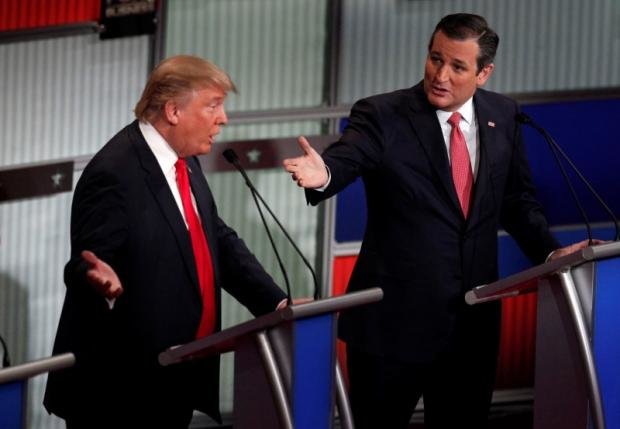How top Republican legislators once vilified Donald Trump

By Cecilia J. Thompson
President Donald Trump was not popular in Africa, except in one country, Nigeria, where he was admired for being “a tough leader.” Nigerians were right, judging by how the former president, who was once vilified by several top leaders of the Republican party who blasted him as “a con artist,” “a big, loud New York bully,” and “a race-baiting, xenophobic, religious bigot,” is now feared by the same top leaders and others.
At a rally held in late February 2016 in Texas during the presidential campaign, Senator Marco Rubio of Florida literally eviscerated Donald Trump, saying “He is a con artist. He runs on this idea he is fighting for the little guy, but he has spent his entire career sticking it to the little guy—his entire career.”
Rubio ridiculed Trump’s claims to be a tough man. The senator told the cheering crowd during that same rally: “A tough guy? This guy inherited $200 million. He’s never faced any struggle.”

One of the lowest points in the entire 2016 presidential campaign was the obscene exchange, live on national television, during one of the debates when Rubio claimed that Trump’s small hands were indicative of the real estate’s small genitals. Trump’s rebuttal prolonged the unpleasant conversation that even Rubio’s children, as the senator recounted later, found distasteful.
Also, there was no doubt on Rubio’s mind that if Trump won the party’s nomination, he would not survive the attacks of the Democratic nominee: “We cannot nominate someone who’s going to be shredded to pieces.”
How things have changed since then! To the point where Rubio was this year on Trump’s short list to be his running mate, after years of defending even some of Trump’s worst acts as president.
It was no different with another influential Republican senator, Lindsey Graham from South Carolina. “The more you know about Donald Trump, the less likely you are to vote for him,” Graham said in an interview with CNN during the 2016 campaign. In Graham’s view, Trump did a big disservice to the party by threatening a massive deportation of Mexican immigrants, as the New Yorker did in his announcement to run for president: “They are not our friend, believe me,” Trump said, before disparaging Mexican immigrants: “They’re bringing drugs. They’re bringing crime. They’re rapists. And some, I assume, are good people.”
For Graham, who was then in his third term, Trump was a danger for the Grand Old Party: “He took our problems in 2012 with Hispanics and made them far worse by espousing forced deportation. Looking back, we should have basically kicked him out of the party.”
A furious Trump fired back with harsh words about Graham and gave out the senator’s phone number live on national television.
In 2016, Trump ran on the agenda to “Make America Great Again, MAGA,” which developed into a movement. As the bad blood between the two men escalated, Graham said publicly: “You know how you make America great again? Tell Donald Trump to go to hell.” But it didn’t stop there, for Graham added, “He’s a race-baiting, xenophobic, religious bigot.”
Like several other Republican lawmakers, Graham later gave in to Trump’s bullying and became one of his strongest supporters in the legislature.
Unlike several Republican lawmakers who came out against U.S. support for Ukraine in the war against Russia, Graham, who serves as ranking member of the Senate Judiciary Committee, repeatedly stated his unwavering commitment to that support. But in the end, he softened his stance because of Trump who is widely suspected to be pro-Putin. The former president indicated he would quickly move to cut aid to Kyiv if he wins the November 5 election.
Senator Marco Rubio and his colleague from South Carolina, Lindsey Graham, are only two of the large group of Republicans who, after eviscerating Trump, bowed to him.
Candidate Trump’s most powerful weapon to win the party’s nomination in 2016 was to bully all the other Republican candidates. He had a nickname for each of them, as he does for other politicians throughout the political spectrum. Jeb Bush, the former governor of Florida, was “Low Energy Bush;” Florida Senator Marco Rubio was first “Little Marco,” and as the two men exchanged more vitriol, Rubio became “Lightweight choker;” Ted Cruz, the senator from Texas, was “Lyin’ Ted,” but the same nickname finally went to Lindsey Graham, as the bad blood grew stronger between the South Carolina senator and Trump.

To bully the influential senator from Texas, Ted Cruz, the real estate mogul claimed, without evidence, that Cruz’s father was involved in the assassination of John Kennedy, and that Cruz’s wife was unattractive. Enough insults to infuriate the Texas legislator who wasted no time in throwing a series of jabs at his toxic fellow Republican, calling him a “sniveling coward,” and “utterly amoral.” “Let me be absolutely clear,” Cruz said, “our spouses and our children are off bounds. It is not acceptable for a big, loud New York bully to attack my wife.”
One of the many swelling controversies of the 2016 presidential campaign was Trump’s reluctance to release his tax returns as politicians usually. Cruz seized the opportunity to once again go after Trump: “The fact that Donald seems terrified to release his taxes suggests that there’s a bombshell there,” Cruz said during an interview with ABC News, adding, “It’s natural to wonder, ‘Well, what is it that he’s hiding in his taxes?’”
Cruz’s attacks against Trump climaxed into his refusal to endorse the party’s nominee—Trump—during the party’s convention. That caused Cruz to be booed off the stage, a sign of Trump’s unmistakable supremacy.
However, as with Marco Rubio and Linsey Graham, Trump finally had the upper hand. Not only did Cruz endorse him two months later, but the Texan became one of the real estate mogul’s most passionate defenders in Congress. After Trump was found guilty on 34 counts of criminal charges by the State of New York, Cruz put out a press release saying, “This is a dark day for America. This entire trial has been a sham, and it is nothing more than political persecution. The only reason they prosecuted Donald Trump is because Democrats are terrified that he will win reelection.”
Cruz’s weak explanation for the 180-degree reversal as reported in October 2022 by CNN reporter Chris Cillizza: “In 2016, we had a primary where Donald Trump and I beat the living crap out of each other…and at the end of the day, he won. And I had a decision to make.” The senator explained, “I could have decided, my feelings are hurt, I’m going to take the ball and go home and not do my job.” Instead, he elaborated, “I had a job to do, and I had a responsibility.”
There was probably also a fear factor—to use the title of a show very popular on American television—if one factors in the fact that several Republican legislators who dared criticize Trump have seen their careers ended by the former president. Chief among them, then-Representative from Wyoming, Liz Cheney, one of only ten Republican members of the House of Representatives who voted to impeach Trump. Cheney, a daughter of former Vice President Dick Cheney, was also one of the only two Republican members of the House to sit on the committee that investigated the former president’s role in the January 6 attempt to overturn Biden’s election. Not surprisingly, Trump sought revenge and backed Cheney’s rival during the 2022 mid-term elections, Harriet Hageman, who defeated Cheney.
Soumanou Salifou (administrator)
Soumanou is the Founder, Publisher, and CEO of The African Maganize, which is available both in print and online. Pick up a copy today!

